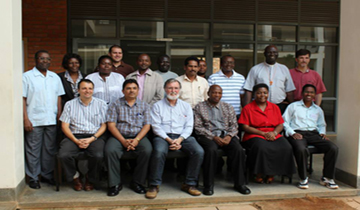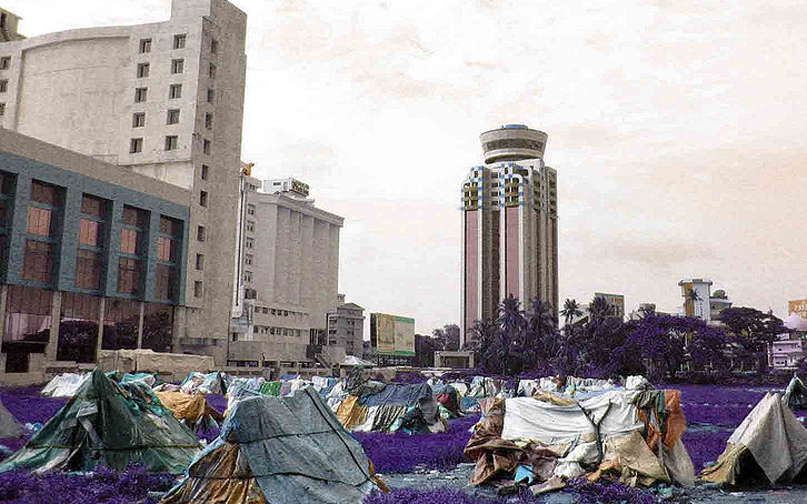Artifact #3: The Spirit of Christ and the Postmodern City
The Spirit of Christ and the Postmodern City
 Based on a case study of four years of developing of a city leadership team of Pentecostals and Evangelicals in Auckland, this book aims to map the progressions from a theology and praxis of revival to processes of transformation of a postmodern city...
Based on a case study of four years of developing of a city leadership team of Pentecostals and Evangelicals in Auckland, this book aims to map the progressions from a theology and praxis of revival to processes of transformation of a postmodern city...
What was the purpose of applying faith to urban transformation?
in the 1990's I brought together city leadership teams for evangelism and transformation. The movement began to grow popular. I could not sustain my global role but sought to model it in my home city of Auckland. This book reflects on the lessons learned and creates paradigms from moving from a phase of 30 years of revival across New Zealand to a phase of structural engagemnt and cultural change.
This was new territory for charismatics and Pentecostals, and the concept has been freeing for them as they mature into cultural engagement.
It is of particular value as New Zealand is at the forefront of postmodern culture, so there are lessons to learn as to how to implement cultural engagement for transformation, or Kingdom engagement, beyond the confusion of postmodernism.
What were the sources of this theological to urban approach?
I built from my years of involvement in revival movements and study of the literature on revival, as well as 12 years of bringing city leadership teams together and the literature that I had previously integrated in our AD2000 City Leadership Manual. At the city level, all of the analysis on the postmodern city fed into a number of paradigms as to how progressions are moving from modern to postmodern to post-postmodern.
SourcesMethodology: Transformational Conversations
 This study included development of a paradigm for theological engagement with urban issues. Based on processes refined in over 30 city consultations with city leaders and urban poor workers, this is interfaced with a theory of Quines' "knowledge as webs" to generate a process that has been used by urban workers as a research paradigm...
This study included development of a paradigm for theological engagement with urban issues. Based on processes refined in over 30 city consultations with city leaders and urban poor workers, this is interfaced with a theory of Quines' "knowledge as webs" to generate a process that has been used by urban workers as a research paradigm...
What has been the impact?
A network of leaders seeking to bring revitalization movement thinking globally based at Asbury Seminary published it as a case study in their series, and its thesis was presented at one of their gatherings. However because this book was published by Emeth Press at a very expensive level, dissemination has not been as wide as with other books. At the same time, I have been concentrating on urban poor missiology, so have not extended my teaching on citywide ministry extensively through the city leadership networks. Nevertheless, where it has gone, there has been impact.
The New Zealand Christian Network used some of the content of this book as a blueprint from which it then developed an extensive national networking process. The Chennai Transformation Network followed the processes documented in the book to bring integration across that Indian city. A brother turned and greeted me at an international city leaders gathering, "your book has been foundational to our grappling with reaching postmoderns in Amsterdam"...
A cluster of significant paradigms
![]() There are a number of new paradigms for urban ministry in this book.
There are a number of new paradigms for urban ministry in this book.
- * The central theme of Transformative Revival, extending the falling of the Holy Spirit on groups into the impact of that on the culture and structures of cities
- * The idea of Transformational Conversations as a research paradigm
- * The exploration of the aposotlic and prophetic giftings that develop from revivals as they apply to the business environment.
* The extensive analysis of postmodernism, and the potential repsonses to moulding the generation beyond it is of significance.
The need for marketing
These reflections indicate I need to work at dissemination and look for greater avenues to teach this material. Gardener's work on The Creative Mind, indicates that creatives that generate domains have a singular focus on multiplying, presetniting or marketing their ideas - be that from narcissim or alturism. Geting locked int a publisher who makes bad decisions as to cost was a great mistake.
From Revival to Transformation of the Soul of a City!


 Establishing a global cadre of educational practitioner-scholars - the MATUL Commission.
Establishing a global cadre of educational practitioner-scholars - the MATUL Commission. Leadership development among the 1.4 billion urban poor.
Leadership development among the 1.4 billion urban poor. Integrating and publishing new fields: Urban poor church- planting; Theology of land rights; Economic discipleship...
Integrating and publishing new fields: Urban poor church- planting; Theology of land rights; Economic discipleship... Pioneering paradigms of city leadership.
Pioneering paradigms of city leadership.